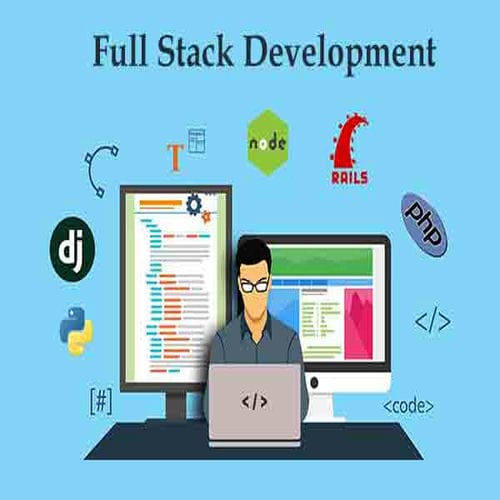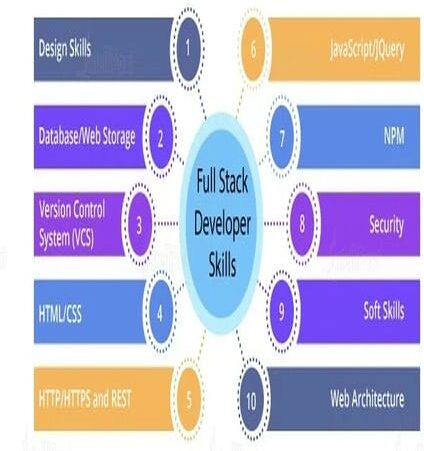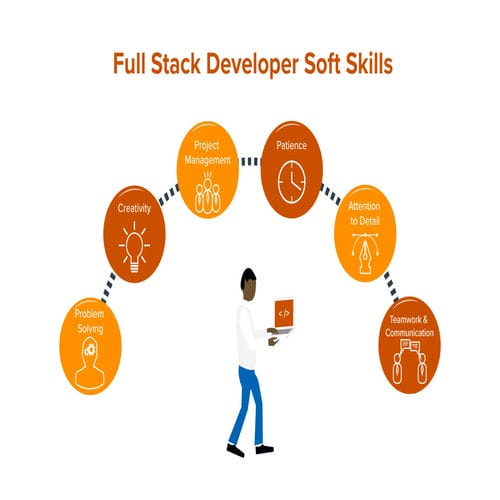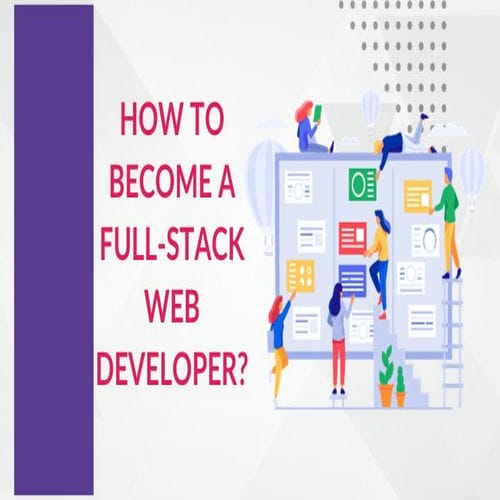Are you ready to unlock the gateway of how to become a full Web Developer? In an era where digital innovation reigns supreme, mastering the intricacies of full stack development has become essential. But what does it take to traverse the realms of both front-end and back-end technologies seamlessly?
In this comprehensive guide, we delve deep into the world of Full Stack Web Development, exploring the fundamental concepts, essential tools, and practical strategies necessary to thrive in this dynamic field.
Whether you’re a seasoned developer seeking to expand your repertoire or an aspiring coder ready to embark on your journey, this article will equip you with the knowledge and insights needed to succeed.
So, are you prepared to embark on a transformative journey into the realm of Full Stack Web Development?
Let’s delve into the intricacies of this multifaceted discipline and unlock the keys to your success.
How to Become a Full Stack Web Developer?
So, what exactly is a Full Stack Web Developer? A Full Stack Developer is proficient in both front-end and back-end technologies. From creating visually stunning user interfaces to designing robust server-side architecture.
1. Front-end Programming
Ever marvelled at a smooth website or a dazzling web application? That’s the handiwork of a front-end developer. Armed with HTML, CSS, and JavaScript, they breathe life into static designs, creating immersive user experiences that captivate and engage. Consider them as the creators, transforming pixels into masterpieces that captivate the senses.
2. Back-end Magic
But what about the magic that happens behind the scenes? That’s where the back-end developer shines. Devoted to constructing the engine room of the web, they wield programming languages like JavaScript (with Node.js), Python, or Ruby to power the server-side logic that drives dynamic content and database interactions. They’re the architects, designing the infrastructure that powers the digital world.

3. The Power of Versatility
What sets Full Stack Web Developers apart is their versatility. By mastering both front-end and back-end technologies, they possess a holistic understanding of the entire web development process. This versatility not only opens up a world of career opportunities but also allows them to tackle projects with unparalleled quickness and effectiveness.
Essential Skills and Technologies
1. Crafting User Interfaces with HTML, CSS, and JavaScript
Ever marvelled at a beautifully designed website and wondered how it came to be? That’s the magic of front-end development. HTML (Hypertext Markup Language) lays the foundation, defining the structure of web pages.
CSS (Cascading Style Sheets) swoops in to add style and visual flair, from colours and fonts to layout and animation. And then there’s JavaScript, the dynamic powerhouse that breathes interactivity into web pages, enabling everything from smooth animations to complex user interactions.
Mastering these front-end technologies is essential for bringing your design visions to life and creating immersive user experiences that leave a lasting impression.
2. Powering the Digital Engine with Programming Languages and Databases
While the front-end amazes people with its visual brilliance, the back end serves as the engine room of the web, powering the magic behind the scenes. Back-end developers are using programming languages like JavaScript (with Node.js), Python, Ruby, or PHP to build the logic and functionality that make web applications tick. But that’s just the beginning.
They also work with databases like SQL and NoSQL to store and retrieve data, ensuring seamless interactions between users and the digital world. With their expertise, back-end developers bring order to the chaos, transforming raw data into actionable insights and delivering dynamic content with lightning speed.
3. Keeping Your Codebase in Check with Git
In the fast-paced world of web development, collaboration is key. That’s where Version Control Systems like Git come into play. Git allows developers to track changes to their codebase, collaborate with teammates, and roll back to previous versions with ease. Whether you’re working solo or as part of a team, mastering Git is essential for keeping your projects organised, efficient, and error-free.
4. APIs and RESTful Services
In today’s interconnected world, web applications rarely exist in isolation. Instead, they interact with numerous of external services and APIs (Application Programming Interfaces) to access data, perform actions, and provide value to users.
Understanding how to use APIs and build RESTful services is crucial for creating dynamic, data-driven applications that integrate seamlessly with the wider digital ecosystem.

Learning Path and Resources
1. Formal Education vs. Self-Learning
When it comes to mastering the art of Full Stack Web Development, there’s no one-size-fits-all approach. Some may prefer the structure and guidance of formal education, while others thrive on the flexibility and autonomy of self-learning.
Whether you’re considering a degree in computer science or diving headfirst into online tutorials and coding bootcamps, the key is to find a learning path that aligns with your goals, preferences, and schedule.
2. Recommended Online Courses and Tutorials
In today’s digital age, the internet is a gold mine of knowledge waiting to be explored. Platforms like Udemy, Coursera, and Codecademy offer a plethora of online courses and tutorials covering everything from the basics of HTML and CSS to advanced topics like full-stack development and cloud computing.
Whether you’re a beginner looking to dip your toes into the world of web development or a seasoned pro seeking to expand your skill set, there’s something for everyone in the vast expanse of online learning resources.
3. Books and Documentation
For people who enjoy the feel of a book in their hands, there’s no shortage of printed resources available to help you master the craft of Full Stack Web Development. From comprehensive textbooks covering the fundamentals of programming to in-depth guides on specific languages and frameworks, the world of technical literature is vast and varied.
And let’s not forget the invaluable documentation provided by the developers of your favourite programming languages and frameworks – a wealth of knowledge just waiting to be unlocked.
4. Coding Bootcamps
For those looking to fast-track their journey to becoming a Full Stack Web Developer, coding bootcamps offer an intensive and immersive learning experience like no other. These intensive training programs provide hands-on instruction, mentorship, and real-world projects designed to equip you with the skills and confidence you need to succeed in the fast-paced world of web development.Top of Form
Building Projects and Portfolio
1. From Theory to Practice
You’ve learned the basics, mastered the fundamentals, and now it’s time to put your skills to the test in the real world. Building your own projects not only solidifies your understanding of key concepts but also showcases your abilities to potential employers or clients.Whether you’re creating a personal blog, developing a portfolio website, or building a full-fledged web application, the only limit is your imagination.
2. Unlock Your Creativity
The beauty of personal projects lies in their freedom and flexibility. From simple static websites to complex web applications, personal projects allow you to explore your interests, experiment with new technologies, and showcase your unique style and creativity. Whether you’re passionate about photography, cooking, gaming, or anything in between, there’s no shortage of project ideas waiting to be brought to life.
3. Contributing to Open Source
Open-source projects are the lifeblood of the developer community, powering everything from operating systems and web browsers to programming languages and frameworks. Contributing to open source not only allows you to give back to the community but also provides invaluable experience working on real-world projects alongside seasoned developers.
Whether you’re fixing bugs, adding new features, or improving documentation, every contribution counts and helps strengthen your skills and build your reputation as a developer.
4. Freelancing and Contract Work
For those looking to gain real-world experience and earn a bit of extra cash on the side, freelancing and contract work offer endless opportunities to put your skills to use. Whether you’re building websites for small businesses, creating custom web applications for clients, or offering consulting services to startups, freelancing allows you to refine your skills, build your portfolio, and establish yourself as a professional in the field.
Continuous Learning and Skill Enhancement
1. Embracing the Journey
In the dynamic world of web development, one thing is certain: change is constant. New technologies emerge, frameworks evolve, and best practices change as innovation progresses. As a Full Stack Web Developer, staying ahead of the curve means embracing a mindset of continuous learning and skill enhancement.
2. The Importance of Staying Updated
From the rise of new programming languages to the adoption of cutting-edge frameworks and tools, staying updated with industry trends is essential for remaining competitive in the ever-evolving landscape of web development.
Whether it’s attending conferences, reading blogs, or participating in online courses, staying informed about the latest advancements in the field ensures that you’re always equipped with the knowledge and skills needed to tackle new challenges head-on.
3. Strategies for Continuous Improvement
In the fast-paced world of web development, it’s insufficient to rest on your achievements. Cultivating a growth mindset means embracing challenges, seeking feedback, and continuously pushing yourself to learn and improve.
Whether it’s tackling new projects, experimenting with unfamiliar technologies, or seeking mentorship from experienced developers, adopting a mindset of continuous improvement is key to achieving long-term success as a Full Stack Web Developer.

Conclusion
Becoming a Full Stack Web Developer is a journey filled with endless possibilities and opportunities for growth. By mastering both front-end and back-end technologies, you unlock the power to create immersive digital experiences and shape the future of the web.
Whether you’re just starting out or looking to level up your skills, keep in mind that commitment, curiosity, and a never-ending quest for information are the steps that lead to expertise.
Ready to embark on your journey? Dive into the world of Full Stack Web Development with Devtrain.co, where you’ll find expert guidance, hands-on training, and a vibrant community of fellow developers. Start your journey today and unleash your potential!



Inscrivez-vous pour obtenir 100 USDT
Thanks for sharing. I read many of your blog posts, cool, your blog is very good.